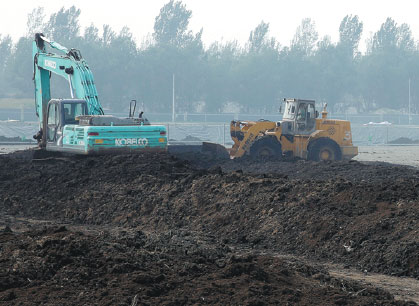Illegal dumping prompts public backlash and calls for tougher regulations
Updated: 2015-12-10 07:59
By Zheng Jinran(China Daily)
|
||||||||
Piles of randomly dumped, malodorous sewage sludge have been discovered in a number of large cities, posing a pollution threat. The growing problem has attracted attention from the public and local governments, and prompted calls for tougher laws to clamp down on offenders.
"When I walk by (the sludge), I have to hold my breath because of the disgusting smell," said Liu Jun, 26, whose parents live in Zhaocun village in the Daxing district in Beijing, where a pile of sludge has been dumped in the dried-out bed of the Yongding River. She said residents first noticed the stench in July.
"My parents are greatly concerned about whether the sludge will contaminate the soil, because it's close to farmland," she added.
The sludge was dumped by the Beijing Drainage Group, which issued a statement saying the river bed is being utilized as a temporary disposal site, and that measures have been taken to neutralize the pungent odor. The local village administration has ordered the company to remove the sludge so it can be treated correctly.
"Recently, members of the public have begun to voice complaints about randomly dumped piles of sewage sludge near their houses. Some have sued the companies involved," said Wang Wenyong, a lawyer with the China Biodiversity Conservation and Green Development Foundation. He said the cases have highlighted the issue, and companies are now less inclined to flout the law.
In October 2010, the district procuratorate in Beijing ruled on the first case of its type in the city. The manager of Huanxingyuan Environment Technology Co was sentenced to three and a half years in prison after the company was found guilty of dumping more than 6,500 metric tons of sewage sludge in two sandpits in the Mentougou district in 2006 and 2007.
The sludge was found to contain toxins, such as heavy metals, ammonia nitrogen and fecal coliforms, which polluted nearby land. The district procuratorate said the cost of recovering the polluted soil and undertaking a wider environmental cleanup was more than 10 million yuan ($1.5 million).
In 2010, a sewage processing plant in Wuxi city, Jiangsu province, dumped about 2,700 tons of untreated sludge directly into the Yangtze River, contaminating both the water and local paddy fields, where it was used for irrigation. Five people involved in the illegal disposal were jailed for three years.
Local governments have taken advantage of stronger laws to fight sludge-related pollution, but more support is needed to help those affected, and social organizations must help to supervise the process, Wang said.
"It's hard enough to locate the sources of sludge, since most of it is dumped at night or clandestinely, let alone sue the people or companies responsible," he said, adding that while very few "green" NGOs have filed cases to date, he expects them to play a leading role in monitoring and prevention in the future.
|
Piles of sewage sludge dumped in the dry bed of the Yongding River in the Daxing district of Beijing, in September. The Beijing Drainage Group said it has taken measures to neutralize the rank odor. Lu Shuchan / for China Daily |
(China Daily 12/10/2015 page6)
- People exit rebel-held area in Syrian peace deal
- Two DPRK music groups to perform in China
- False bomb alert prompts security measures at Mexico City airport
- Russia fires missiles at IS positions
- US House passes bill to tighten visa waiver program
- Obama, Modi vow to secure 'strong' climate change agreement

 Panchen Lama enthronement 20th anniversary celebrated
Panchen Lama enthronement 20th anniversary celebrated
 Printer changes the chocolates into the 3rd dimension
Printer changes the chocolates into the 3rd dimension
 Think all Chinese dama do is dance, buy gold? Think again
Think all Chinese dama do is dance, buy gold? Think again
 China's top 10 venture capital firms
China's top 10 venture capital firms
 33-car pileup leaves six dead, four injured in Shanxi
33-car pileup leaves six dead, four injured in Shanxi
 US marks 74th anniversary of Pearl Harbor attacks
US marks 74th anniversary of Pearl Harbor attacks
 Christmas lights across the world's shopping districts
Christmas lights across the world's shopping districts
 Top 10 best airports where flight delays aren't a pain
Top 10 best airports where flight delays aren't a pain
Most Viewed
Editor's Picks

|

|

|

|

|

|
Today's Top News
Shooting rampage at US social services agency leaves 14 dead
Chinese bargain hunters are changing the retail game
Chinese president arrives in Turkey for G20 summit
Islamic State claims responsibility for Paris attacks
Obama, Netanyahu at White House seek to mend US-Israel ties
China, not Canada, is top US trade partner
Tu first Chinese to win Nobel Prize in Medicine
Huntsman says Sino-US relationship needs common goals
US Weekly

|

|









